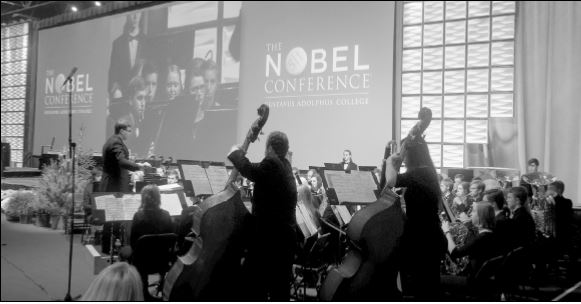Anticipation is in the air as the 53 Annual Nobel Conference is only days away. This year’s Conference “Reproductive Technology: How Far Do We Go?” will focus on the scientific, social, and ethical questions of reproductive technology.
One event exploring these questions is the free Nobel Concert at 8 p.m. on October 3 in Bjorling Recital Hall.
This concert will feature three works which span several genres and eras of music.
One of the pieces is an original string quartet composition by Gustavus faculty Dr. Alexandra Bryant entitled, “Lady Isabelle Was That Kind of Woman.”
Bryant composed her quartet when The National Endowment for the Arts chose her to write a composition based on Appalachian inspiration.
She found inspiration in a piece that, “introduced this old tune; she started out by saying ‘Lady Isabelle was just that kind of woman’ and there was something about the way she said Lady Isabelle that caught my attention,” Bryant said.
She took this brief phrase, reworked it, built on top of it, and breathed life into it, to composed her piece.
In a sense, Bryant is much like the geneticists who wield the powers of reproductive technology.
Though the means and subject matter are different for geneticists and composers, the ends are the same—both edit and rework their existing subjects.
In the case of a composer, he or she may take themes of an already existing composition and modify them to his or her liking to create a new composition. Bryant heard something that she enjoyed and she expressed it in her own way.
In the case of a geneticist, he or she tries to modify and edit humane genomes to change hereditary conditions.
The Nobel Conference mission statement is: ‘The Nobel Conference brings students, educators, and members of the general public together with the leading thinkers of our time, to explore revolutionary, transformative and pressing scientific questions and the ethical issues that arise with them.’
“It’s obvious why the physical and social sciences are essential to that exploration. But the history of the liberal arts shows us that all the ways in which humans study and reflect on their world make vital contributions to scientific and ethical questions.
Music is certainly one of those essential ways [because] it can connect us to our humanness and explore scientific questions in myriad ways,” Nobel Conference Director, Professor Lisa Heldke said.
One could say music is in itself very scientific, especially composing music. There are many variables and values to control—pitch, tone, length, dynamics.
So, listening to a meticulously constructed piece of music can be comparable to reading a scientific report or study: each process is the analysis and interpretation of a public result.
Therefore, if one can comprehend the process and product of a musical composition, it may help this person understand a scientific study or even larger ideas.
“[Ultimately] we need music as a means of understanding our world,” organizer of Tuesday’s concert, Chad Winterfeldt said.
Composing music delves into ethics, for if composers use snippets of other composers’ works, the line of ownership and originality becomes blurred. “At what point is it creativity and at what point is it stealing?” Bryant said.
The other two pieces in the concert are “A Musical Offering” by J.S. Bach, and “T42,” and an arrangement for jazz combo by Gustavus faculty Dave Stamps.
Both highlight this idea of the science and ethic of reproduction in music in their own unique ways.
For those looking for an interesting auditory and educational experience, this is the concert for you.
